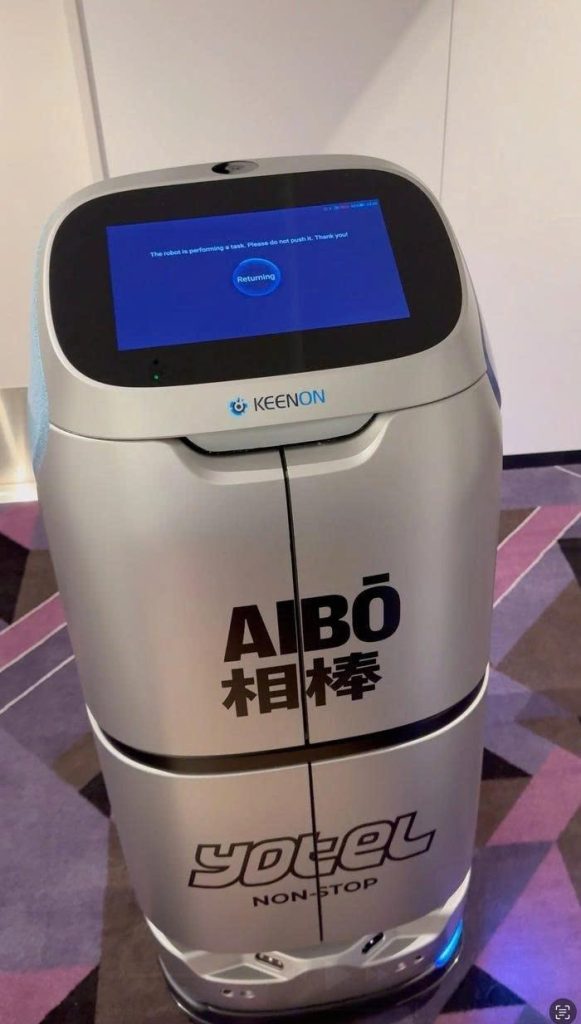At the Yotel hotel in Ginza, Tokyo, the modern concept of the Robot Hotel is solving Japan’s staff shortage crisis. Autonomous robots efficiently deliver essentials like pajamas right to the room in under three minutes and guide guests seamlessly to the elevators.
With tourist numbers projected to peak in 2025, labor shortages have compelled Japan’s hospitality industry to innovate to meet demand. This is a topic that Michelle Gross, a writer for Business Insider, has been closely monitoring for nearly a decade.
She previously had an uncomfortable experience with a robot hotel in Tokyo back in 2019 due to the faulty technology. Therefore, when Yotel Tokyo Ginza, a hotel incorporating a new generation of robots, opened earlier this year, she decided to try the experience to see how the technology had improved.
Japan has long been a global leader in technology (the Shinkansen trains, ubiquitous vending machines) and is also famous for its culture of “omotenashi” (wholehearted hospitality). As a result, writer Gross was very curious to see how a robot hotel would balance these two elements.

Her curiosity, mixed with skepticism, stemmed from her poor experience in 2019 at the Henn Na Hotel Tokyo Ginza. Despite its convenient location, the technology at the hotel was full of glitches, and the human-like robot receptionist made her feel uneasy.
This time, she tried Yotel Tokyo Ginza, a new hotel also located in the vibrant Ginza district, close to the Tsukiji Market and the Kabukiza Theatre. This is an expensive area with average room rates ranging from $340 to $444 per night, but the price at Yotel was only about $133.
The experience at Yotel began right at the “Mission Control” reception area, which has a futuristic theme. Guests can self-check-in at kiosks in less than a minute, although Gross noted that most still chose to complete the process with traditional staff members. The hotel also offers baggage delivery services to Narita or Haneda airports (for a fee).
Yotel Tokyo has two robots (or “yobots”) named Tomo (friend) and Aibo (colleague). These robots assist in escorting guests to their rooms and performing room service, which reminded Gross of the robot Rosie in the cartoon The Jetsons.

During her stay, the robot Tomo escorted Gross from the lobby to the elevator and up to the 6th floor. While interesting, she felt this feature wasn’t strictly necessary. The receptionist mentioned that the hotel hopes the robots will soon be able to deliver luggage to the rooms, which Gross considered a much more useful function.
However, Gross was very impressed with the speed of the robot service. To minimize waste, amenities such as pajamas and toothbrushes are only provided upon request. A yobot delivered the requested items to her door in less than three minutes. They can also deliver food or beverages from the restaurant. Guests simply follow the instructions, press the button to open the robot’s compartment, and take the items out. After completing its task, the robot returns to the lower level.
Regarding accommodations, the hotel has 244 rooms. Gross stayed in a Premium Plus room at the front, which featured a large, floor-to-ceiling glass window overlooking the Ginza area. Although the room and shower area were small, the clever design compensated for the limited space. Gross particularly liked the SmartBed, which can adjust its incline at the touch of a button—a perfect feature for her, as she often works from her bed when traveling.
In the context of Japan facing an aging population and labor shortages, Yotel’s model—a blend of human and robotic assistance—is becoming increasingly common. Gross also observed robots at Haneda Airport and a café where robots were remotely controlled by disabled individuals.
Gross was highly satisfied with her stay at Yotel and would readily return. She appreciated how the hotel seamlessly integrated robots into the overall experience but wished for the robots to have more functions, such as delivering luggage or making coffee.
(According to Business Insider)
- Best Vietnamese Beaches for an Unforgettable Family Vacation
- Motorbike Tour Vietnam Safety Tips: Your Essential Guide
- Phu Quoc’s Kiss Bridge: A Pearl Island Masterpiece
- A female tourist faces five years in prison for pole dancing with the Turkish flag
- Vietnam Public Transportation Guide: Get Around Like a Local

















